- Home
- Ian Wallace
The Rape of The Sun Page 14
The Rape of The Sun Read online
Page 14
Bill hit the screen with projected light. “Imagine space-time as a two-dimensional circle,” Bill proposed, drawing such a circle on the transparency whence it was thrown to the screen enlarged. “The outer periphery of the circle is space in the present: it represents the now-space of the entire cosmos.
"Okay. Assume that you are a Dhorner flying a spacecraft departing from this point on the circle—I will label the point A for Andromeda. You are proceeding to this point on the circle, and I will label the destination O for Our Solar System. If you travel the obvious way, along this in-between arc of the present circle, you must traverse a distance of two million light-years. But your schedule calls for merely a twenty-six-day trip; and even if your vehicles have trans-light velocity, their speed is only a tiny fraction of what you need* Follow me so far?”
Affirmative grunts.
“Good. Now let’s explore the properties of our space-time circle further. Here, I put in a spot for the center of the circle, which is the theoretical beginning of time—theoretical, I say; probably time has no beginning. And I draw a radius from A to the center, and another radius from O to the center. A radius of the circle is a descent into past-time. If you drop straight down from the periphery toward the center, you are moving in time from now into past. Future can be neglected as merely uncertain potentials outside the definite circle of the present.
“Now, imagine that all bodies in the present, along this outer circle, are each instant reproducing themselves in a new present mass; and that the original bodies are sinking into the past, giving way to their descendants. Do you get that idea?” Noticing our puzzlement, Bill added: “Imagine the same thing of a single simple particle such as a quark. Suppose that each quark dies after each present instant, reproducing itself for the next present instant; and that the original quark then sinks into the past and continues to exist in the past. Do you get that?" He waited; half a minute later, we all had affirmed.
Bill then said: “We can therefore draw a second circle just inside the outer circle and concentric to it. This inner circle represents the immediate past era in which the perished bodies continue to exist. Okay?”
Sven said: “For the argument, okay.”
“Carry this further,” promptly Bill proceeded. Tm drawing another circle which is way inside the outermost circle. This represents some remotely past era wherein the long-perished generations-ago ancestors of present particles continue to exist. As time goes on, each new generation pushes the whole chain of prior generations more deeply into the past. And of course, I could draw an indefinite series of circles, each inside the others, becoming more and more compressed as they proceed toward theoretical center. Such a cross section would resemble the annual rings in a cross-cut of a tree.
“Next point. If the Dhomers were to travel to our solar system on the outermost circle of the present, bringing it off in twenty-six days, their velocity would have to be twenty-eight million times the velocity of light. Now, understand me: I don’t deny the possibility of a discrete corpuscle such as a spaceship surpassing light-speed. That velocity as an absolute limitation was an epistemic requirement of Einstein’s mathematics. In the nature of things, it may hold for spatial propagations such as electromagnetic waves; but for spaceships, more likely that limit is analogous to the sound barrier— which was extremely tough to break, but was finally broken. Excuse the digression.
‘‘Perhaps the Dhomers have broken the light-velocity barrier. Nevertheless, exceeding it by a factor of twenty-eight million seems pretty thick.
“But now, take another look at this deep inner circle. You will notice that along this circle, the distance between radii is smaller than it is along the outermost circle. It follows from my hypothesis that along this circle in the past, everything in the past is smaller than its descendant in the present. I do not know how much smaller, this is only a hypothesis; but on some theoretical considerations, let us say, that the magnitude and mass of every past object diminish by twenty-five percent each century. That diminution is steady: during the second century into the past, the diminution will be twenty-five percent of the size at the end of the first century, and so on.
“All right. Suppose the Dhorners have learned how to move in time—”
Wel ejaculated: “Bill, do you secretly write science fiction?”
“I do toy with it,” Bill confessed, “but my product doesn’t sell. Anyhow. Suppose that they can move as much as five thousand years pastward in time, set a spatial course along that inner circle, move spatially to the target radius, and then in time move back to the present time at their target. Suppose that the two time-transitions have insignificant duration—why not? Time is not another dimension of space, it is qualitatively different; the spatial analogy is only an epistemic convenience. And suppose further that when the Dhomers push themselves down into the past artificially, for some reason known to them their sizes and the sizes of their ships do not diminish as they would were they sinking naturally into the past. Instead, their sizes and their energy resources remain the same, which makes them giants relative to anything else along the past circle.
“If they could do this, why then the distance-length of their trip, instead of being about 1.89 x 1019 kilometers as it would be on the outer-most circle, would be reduced along the five-thousand-years-old inner circle to 1.33 x 1013 kilometers. That distance could be traversed in twenty-six days with a speed around five million kilometers per second, which is a mere seventeen times the velocity of light. Which is more nearly believable.
“If they could go even deeper than five thousand years into past time, a point would eventually be reached where they could do it in less than the speed of light. And if further they have truly achieved a time-chord technique—to which they have several times referred in the Collins visions—the distance would be ever shorter, and their velocity for a twenty-six-day trip could be commensurately less. I could calculate that—”
Abruptly Bill went timid. “What do you think, friends? Does this make sense, or is it wild fantasy?” He cut off the projection light and sat waiting in dimness.
After silence, Sven went to work on his pocket calculator. Wel put in: “Collins, when they called the gas niedersinken9 was niedersinken the word they actually used?”
. Collins replied: “Niedersinken was the word that arose in my mind corresponding to the thought they were expressing.”
“Do you speak German?”
“Tolerably well.”
“I thought so. Niedersinken to a German might mean to downsink. Maybe their analogy is that the gas makes you diminish to the size you were as a child—”
Sven looked up from his calculator. “Go back to your projector, Bill. Give us the picture again.” The room lighting still was low; Bill did so.
Said Sven: “Take a look at that target destination marked O. Please erase it from the outside circle.” Bill’s forefinger did it, leaving a smudge.
“Now,” directed Sven, “place the O on its radius on the first circle inward, and call that circle four hundred years in the past.”
Bill complied and snapped off the projection light, and stared at the blank screen.
Collins reeded: “I think you’ve got it!”
Sven rheostated up the rumpus-room lights. Bill was in his chair, hands hanging, head down and shaking.
“The pitch is, I think,” Sven monotoned, “that we have been downsunk by their niedersinken about four centuries into our own past. Even if the Dhomer ships are immune to time-shrinkage—being made of their megalite, perhaps—we are not immune. On Bill’s assumption, a four-century sinkage into past brings our sizes down to 31.6 percent of what they were. And that corresponds with the increased relative sizes of the stars.”
“And explains,” Collins added, “why the solar system continues to hang together.”
I objected: “It does not seem to explain why the stars appear larger. If we are four hundred years ago, we should be seeing the stars of four hundred years ago�
�and they too would have diminished by natural time-sinkage, so they would seem their usual sizes. Not so?”
When Wel answered, his voice was eerie. “Possibly not, Helen, possibly not. Perhaps our descent into the past at four hundred years is so shallow that we continue to see the stars of the present, as though through a time-window; and the stars of the present seem three times as large to us in the past who are two-thirds smaller.”
“Now how,” I demanded, “can you consider a four-century time-descent shallow?”
“But it is, it is,” Wel almost whispered. “It is only sixteen generations, it is only eight half-century lifetimes laid end to end. It is such a little, little time that—Helen, think: even as we sit here, in what can be called the year 1595, my one-way friend sweet William Shakespeare is in the high prime of his flowering.”
Sven answered Wel with gentleness. “Not quite so, my two-way friend. We seem to have pushed down sweet Will another four hundred years beneath us. Still he is in his high prime—but we continue four centuries after him, still in our high prime for whatever that may be worth—but four centuries earlier than the intended germination of our world.”
14
Alone in his bed long after his return to his quarters in Sylvanopolis, Sven lay awake on his pillow, contemplating in obscurity his ceiling, meditating on the astonishing revelations of the evening.
Very particularly, he reabsorbed Wel's late-evening whisper: “Helen, think: even as we sit here, in what can be called the year 1595, my one-way friend sweet William Shakespeare is in the high prime of his flowering.”
The remark had extra dimensions for Wel's friend Sven— who was recalling the last part of our housewarming party, after Collins had emitted prophecy and had run away. For Sven, it was upon Wel that this last part of the evening had centered....
Collins had murmurously expounded a system of five old mysteries which never really grow old. Afterward he had announced with clarity a most fearsome sort of modem mystery; and because if there was any meaning to it the solar satellite program might be threatened, Sven kept reminding himself that he was not supersititous. Meanwhile, all six mysteries were breeding heartily in our party guests, like oriental germs which would not die.
And these germs appeared to be breeding with peculiar virulence in Wel, who was tight-lipped, frowning, and silent. Was it caused by the shrinkage theory which Collins had voiced? Only in part, Sven thought. Something about the Collins contemplation of five ancient mysteries had taken hold of Wel deeply; that was what it was.
He noticed that I too was quiet, that I kept watching Wel. Helen, Sven reflected, in many ways knew Wel better than Sven did, and quite naturally so. Sven was sure that I was sensing the deep-down nature of Wel's disturbance.
General party-vaccination was in order. Sven got Bill talking: perhaps die astronomer’s rigorous objectivity would Americanize the guests. Unfortunately, Bill moved out into interstellar space, and relativity came up, and somebody mentioned Eddington, and Sven had to open his big mouth about maybe the physical world was mind-stuff; here Wel shut them off with a rapidity that was mystifying. I looked hopefully at the French teacher, whose moustaches were vibrating, but Wel shook his head—Baudelaire would not be a vaccine.
Sven passed the ball to the biology teacher, a nice, homey, bald, paunchy, fortyish little fellow with a plump wife and four kids. He responded with an opener about how practically every kind of vertebrate animal will fight to protect its home territory—or will at least make some fighting bluff-motions. This topic seemed promising as Collins-prophylaxis, especially when a few women got into it, and the Sacred Hearth came in for noble eulogy, and that deflected the talk to babies. Great! Only, here the biologist innocently men-1 tioned that there was an unbroken stream of heredity from any human or lower animal back to primeval life and beyond.
Wel, who had been playing the floating host, returned to Sven’s cluster of seven or eight people just in time to hear the last pronunciamento. And again Wel surprised Sven and intensely interested me with the aghast countenance. Sven grew certain that the Collins rhapsody of mystical conjunction had done something to his friend.
But I was seeing a chance to maybe bring out something that my husband had long been self-hurtfully suppressing into a guilty hinterland. To jog Wel, I asked the biologist: “Isn’t that a kind of scientific justification for the idea of mystic unity?” “I wouldn’t go quite that far—” began the biologist, but Sven noticed that I had already done some kind of damage—to mischief Wel or to stimulate Wel, Sven didn’t know which. Adroitly, though, Wel moved in to scatter the cluster with trumped-up pretexts.
If Sven had been pondering the sixth Collins mystery, the one about diminution, Sven’s perception of the undercurrent between Wel and me turned his mind away from that concern. Desire to divide husband and wife was no part of Sven’s intimate interest in me: Sven loved both of us. In the case of Wel, Sven’s love was a man-to-manness, and something in a male psyche makes that kind of relationship a special thing.
Simultaneously, I was sensing the nature of Sven’s concern and the man-to-manness aspect of it. That indefinable sort of affinity I regarded with wistful envy; I was sure that there must be a roughly equivalent woman-to-womanness, but personally I hadn’t encountered it. I suspected almost to the point of certitude that if Sven should ever detect acute discomfort in Wel about our triune interplay, Sven would give me up even over Wel's protests. The thought didn’t make me jealous—I loved them—but it was profoundly troubling.
It was clear to Sven—now, at nearly midnight, with crowd spirits a-soar—that while Wel specifically wanted to steer conversation away from Collins mysticism, I would like to see it get back there. So Sven took me into the kitchen for the purpose of milking me delicately.
I shut the doors to the kitchen, explaining: “Anybody will knock, I think.” Sven prepared alcohol. I leaned back against my new electronic range; my half-smile had passed from sleepy to languid, but Sven knew better than to presume on that; Sven would not be taking me home with him tonight.
Handing over my drink (Johnny Walker Black, with water), Sven put it to me: “Tell me, Hel—why are you all being so infernally eager to avoid the Collins topic? All except you, that is.”
“Perhaps it’s a subversive topic,” I said, sipping. “Does it matter?”
“Anything so energized with evident effort must matter.”
“Sven, when you’ve been drinking, you sound like Beowulf.”
“Helen, why is Wel dodging the Collins area? It isn*t like him. I thought he was into oriental religion, in a poetaster sort of way.”
“He likes Confucius. I think he is a Confucian.”
“That’s what I mean. . . . Oh. Oh, wait. Helen, is Collins really that naive—or did he maybe do it on purpose?”
“Did he maybe do what on purpose?”
“You know. You may even have prompted Collins to do it.”
“Not guilty of whatever, Sven. I’m really lost; pray unravel.”
“Ravel.”
“Mencken to the contrary notwithstanding—unravel.”
“Look, Helen. Collins mentioned fellow-feeling, man-to-manness. That’s out of Confucianism. Confucius called it jen." Sven correctly pronounced it ren with a palate-blurred r.
I riposted: “Confucius say that? With a French accent like that?”
“Let me pursue this, Hel. Of course Wel's interest in Confucius brought him into close attention. But then Collins contaminated Confucianism with Taoism and Buddhism—and even Brahmanism, now I think of it.”
“I don’t think I’m interested.” Having set down my drink, I was leaning back with my hands behind me on the cold stove. I was interested.
Sven said, “Mysticism in the Orient takes at least four marked forms. The Confucian mystic is the most matter-of-fact; there is jen, man-to-manness, it exists between people, it is real and indescribable. I guess I feel that way about Wel, and maybe even about you.”
“Oh, my
!”
“The Taoists take it further. You remember Collins talking about the tightrope above heaven and Earth? That is the mystic semi-trance condition of Lao Tse, and it is tao, which is sometimes the way, but sometimes, too, it is the bridge. Do you see the tie-in between the way or the bridge with man-to-manness—the same feeling given different emphases by two Chinse philosophies?”
“At least, Sven, you have me on that tightrope.”
“Then shift the scene to India. Consider the Brahman or mystic All which the Hindu seer admires and in which, by trance, he seeks to immerse himself. This impersonal Brahman is all-pervasive, all-spawning, all-devouring; it is the only reality, beneath which everything that we call real is merely transient stuff like Plato’s fire-shadows or like the shifting images on Cocteau’s movie screen. These evanescent so-called realities of ours, believe the seers, are differentiated transiently out of the All and are destined to dissolve into the All. Again, Isn't this comparable to Confucius? Didn’t Collins intimate that the mystery of grasping the All in a state of trance is no greater mystery than true and honest friendship?”
“I’m friendly, Sven. Am I mysterious?”
“But Collins talked about focusing attention on one’s navel. Here he was alluding to a Buddhist practice for the purpose of concentrating all of oneself on the object of one’s quest, the center of one’s being. And a Buddhist seeks, not the
Brahman All, but Nirvana the Ultimate Nothing—which is precisely the same thing, of course you must see that?”
“Certainly that would be true, Sven, if, as Collins said also, the whole world were shrinking. Ultimately the All would shrink into nothing.”

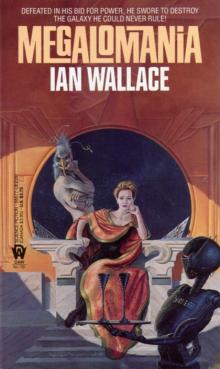 Megalomania
Megalomania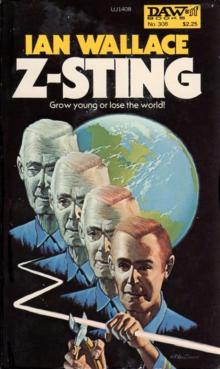 Z-Sting (2475 CE)
Z-Sting (2475 CE)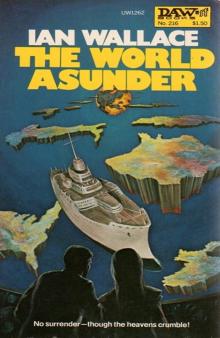 The World Asunder
The World Asunder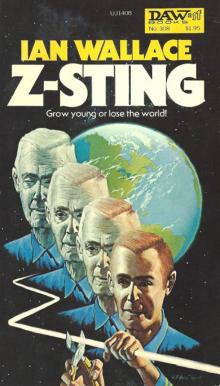 Z-Sting
Z-Sting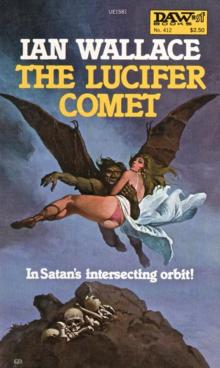 Lucifer Comet (2464 CE)
Lucifer Comet (2464 CE) A Voyage To Dari
A Voyage To Dari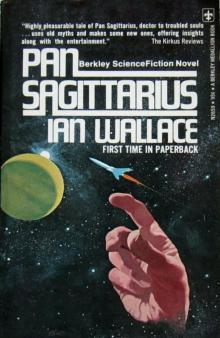 Pan Sagittarius (2509 CE)
Pan Sagittarius (2509 CE)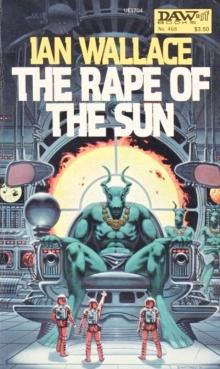 The Rape of The Sun
The Rape of The Sun